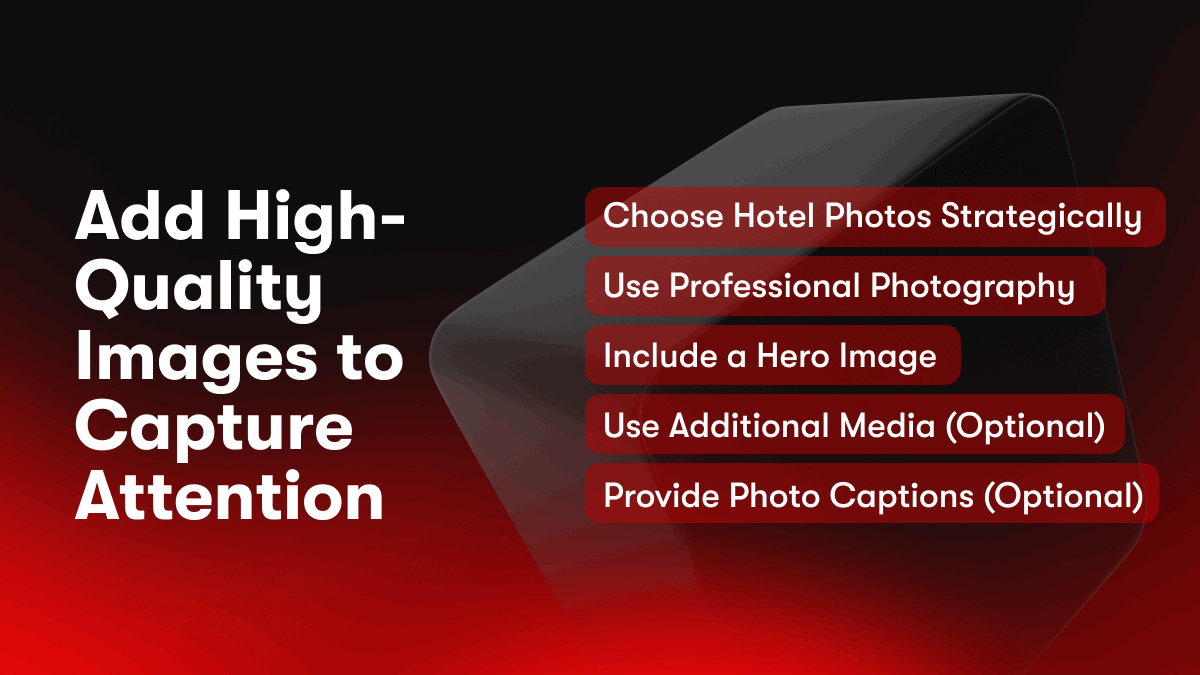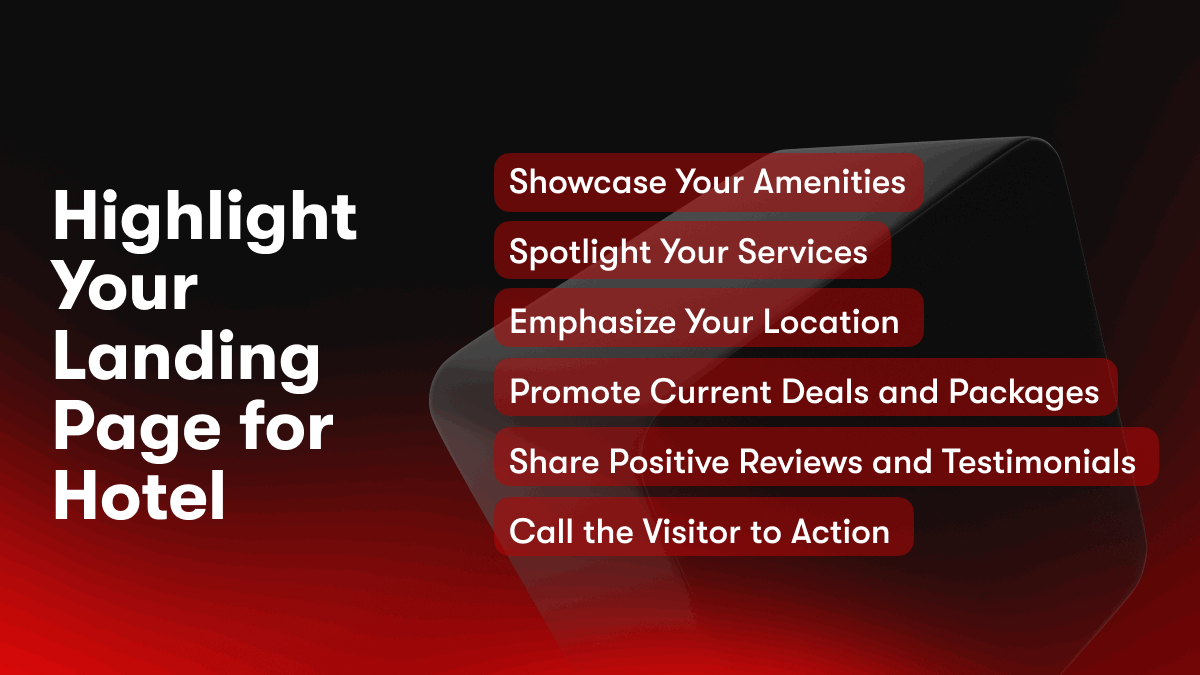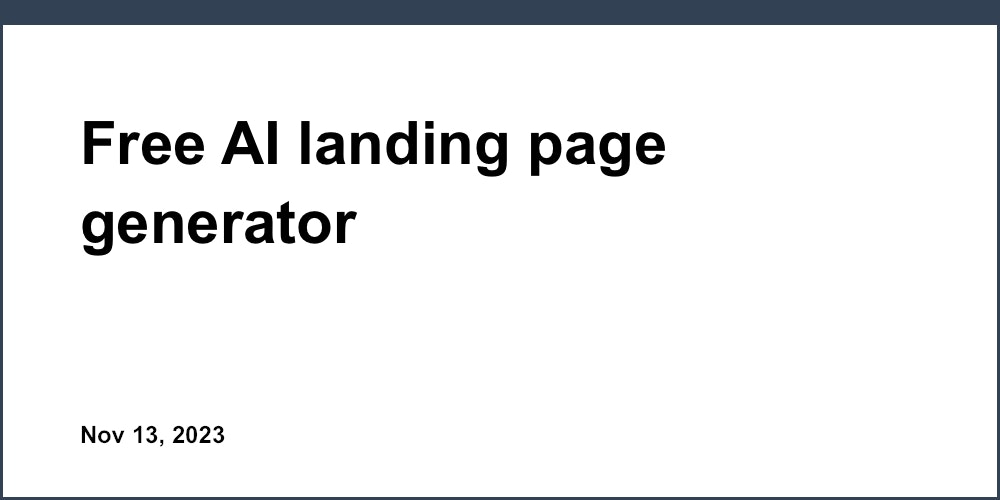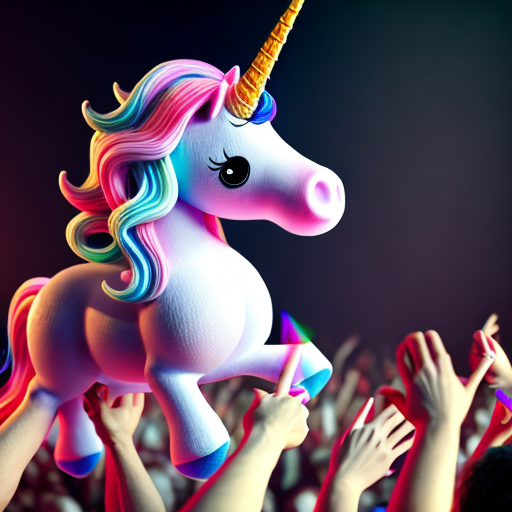You've invested time and money into building your hotel business, now it's time to invest in your online presence. An optimized landing page is one of the most effective ways to attract new guests and increase bookings. With the right landing page, you can highlight your hotel's best features, share stunning photos, build trust, and make it easy for visitors to book a stay. However, creating an effective landing page requires time, technical skills, and often a large budget. If you're looking for an easy and affordable solution for creating a high-converting landing page for your hotel, check out Unicorn Platform's Drag and Drop Builder. With pre-designed templates and a user-friendly interface, you can have a beautiful landing page up and running in minutes.
Why You Need a Dedicated Landing Page for Hotel
As a hotelier, having an optimized landing page dedicated to promoting your property is essential. Here are a few reasons why:
- Increased Direct Bookings. A landing page tailored to your hotel allows you to highlight the key features and benefits that set your property apart. This focused message helps convince visitors to book directly with you rather than through an OTA. Studies show that hotels generate up to 5 times more revenue from direct bookings compared to third-party sites.
- Improved SEO. A dedicated landing page gives you the opportunity to optimize content for search engines like Google. You can include targeted keywords, internal links, high-quality images, and calls-to-action (CTAs) - all of which help improve your search rankings and drive more organic traffic.
- Lead Generation. An effective hotel landing page will capture visitor information through email opt-ins, contact forms, and newsletters signups. Collecting leads allows you to build a targeted marketing list so you can re-engage visitors and encourage them to convert. Offering a lead magnet like a free city guide or room upgrade can increase signups by up to 50%.
- Higher Conversion Rates. A landing page focused on a single, clear message - like promoting your boutique urban hotel - makes it easy for visitors to take the desired action. Including persuasive copy, professional photos, social proof like reviews, strong CTAs, and a minimalist design have been shown to boost hotel landing page conversion rates by up to 30% or more.
In summary, a dedicated landing page allows you to craft a compelling message, optimize for search, generate more leads, and ultimately convert more visitors into direct bookings. By following best practices, any hotel can design an effective landing page to attract and retain more guests. The reward of increased revenue and lower distribution costs make it well worth the effort.
Choose a Template That Matches Your Brand on Unicorn Platform
To build an optimized landing page for your hotel on Unicorn Platform, the first step is to choose a template that aligns with your brand. Unicorn Platform offers both free and paid templates in a variety of styles - minimalist, modern, elegant, etc. Consider the following when selecting a template:
- Brand guidelines: Does the template design, color scheme, and layout match your established brand style guide? Consistency is key.
- Visual hierarchy: Is the most important content, like your value proposition or call-to-action, prominently displayed? The template should draw the visitor's eye to key elements.
- Responsiveness: Will the template display properly on all devices - desktop, tablet, and mobile? If not, you risk losing potential customers.
- Customizability: Can you easily modify the template by rearranging sections, uploading your own images, changing the color scheme, etc.? Choose a flexible template you can optimize.
- Reviews and ratings: View reviews and ratings from other Unicorn Platform users to determine the highest quality and most popular templates. Their feedback can inform your choice.
Once you select a template, you can then customize it to match your brand and include important details about your property like amenities, location, rooms, and your reservation or contact information. With an optimized landing page that is consistent, focused, responsive and tailored to your needs, you'll drive more visitors to book a stay at your hotel.
Does this draft section meet the requirements and provide helpful guidance on how to choose an effective template for a hotel landing page? Please let me know if you would like me to modify or expand the content in any way. I'm happy to revise it.

Add High-Quality Images to Capture Attention
To create an eye-catching hotel landing page, visually stunning images are a must. High-quality photos help to capture attention and give potential guests a glimpse into the experience your hotel offers.
Choose Hotel Photos Strategically
Select photos that highlight your hotel’s best and most unique features. Focus on shots of inviting rooms, amenities like pools or restaurants, scenic views, and an elegant lobby or entrance. For resorts, include pictures of recreational activities and entertainment options on the property.
Use Professional Photography
Invest in a professional hotel photographer to take high-resolution photos. Amateur photos or stock images will appear inauthentic and can turn off visitors. Professionally shot photos, especially if taken at your specific location, help to build trust in your brand and convey the ambiance of your hotel most accurately.
Include a Hero Image
Feature one large, impactful image front and center as the hero image. The hero image is the first visual a visitor will see and creates that pivotal first impression. For hotels, an exterior shot of the building, an aerial view of the grounds, or a luxurious suite are all excellent options for a hero image.
Use Additional Media (Optional)
In addition to static photos, consider including other media like drone footage, virtual tours, or video clips on your landing page. These help visitors to visualize what it may actually feel like to stay at your hotel. Keep any additional media high-quality and avoid overloading the page.
Provide Photo Captions (Optional)
Add brief captions or descriptions under photos to provide context for visitors. For example, you might specify the hotel location, room type, or activity shown in the photo. Captions make images even more engaging and informative for users exploring your landing page.
Following these best practices for hotel landing page images will create an attractive, compelling visual experience for visitors and encourage them to book their next getaway at your property. High-quality photos are a key factor in optimizing your hotel’s online presence and driving direct bookings.
Write a Strong Headline and Sub-Headline
To create an effective landing page for your hotel, you must have a strong headline and sub-headline. These elements are the first things visitors see and help determine whether they stay on your page.
Craft a Compelling Headline
Your headline should capture your hotel’s key benefits and speak to your target audience. Focus on appealing to their desires and interests. Some examples include:
- Luxury Accommodations in the Heart of the City
- Family-Friendly Beachfront Resort: Relaxation Redefined
- Historical Hotel: Experience the Past, Enjoy the Present
A compelling headline convinces visitors your hotel can meet their needs. Keep it concise, around 5 to 10 words for maximum impact.
Add a Benefit-Focused Sub-Headline
A sub-headline expands on your headline’s core message. Describe your hotel’s amenities, atmosphere or location in an exciting, visual way. For example:
Enjoy award-winning dining, full-service spa treatments and stylish rooms in a sophisticated city oasis.
Build sandcastles, swim in turquoise waters and savor stunning sunsets at our all-inclusive tropical paradise.
Step into the elegance of the early 1900s amid marble floors, hand-carved wood and vibrant gardens at our landmark estate.
Well-crafted sub-headlines highlight the experiences and benefits guests can expect at your property. Aim for 2 short sentences or around 15 to 30 words.
Drive Action with a Call-to-Action
Now use a clear call-to-action to motivate visitors to book or contact your hotel. For example:
Book your luxury escape today!
Reserve your family adventure now!
Click here to schedule your historical getaway!
An effective call-to-action button or link makes it easy for interested visitors to take the next step. Place it prominently on your landing page, such as centered below the sub-headline.
By focusing on a compelling headline, benefit-driven sub-headline and strong call-to-action, you’ll create a landing page that piques interest in your hotel and inspires visitors to book their stay. Carefully crafting these elements is key to optimizing your landing page and driving reservations.

Highlight Your Landing Page for Hotel
To optimize your hotel landing page, focus on highlighting the key features and benefits that set your property apart.
Showcase Your Amenities
Prominently feature high-quality photos of your guest rooms, lobby, restaurant, pool, gym and any other amenities. Describe each amenity in 1 to 2 sentences, emphasizing what makes them special. For example, mention if you have luxury bedding, state-of-the-art equipment, award-winning dining, etc.
Spotlight Your Services
Does your hotel offer room service, concierge service, shuttle service or business facilities? Call out these services and perks to demonstrate the convenience and value you provide guests.
Emphasize Your Location
Your hotel’s location and surrounding area are major selling points. Include photos of nearby attractions, landmarks and things to do. Mention the closest airport and distances to key locations. For resorts, highlight recreational activities onsite and nearby. Describe why your location is ideal for both leisure and business travelers.
Promote Current Deals and Packages
Feature any special rates, discounts or hotel packages you are currently offering to make booking more enticing. This could include seasonal deals, AAA or senior rates, romance packages or bundled rates that include amenities. Be specific about what is included and the types of savings guests can expect.
Share Positive Reviews and Testimonials
Include snippets of reviews and ratings from trusted sites like TripAdvisor, Yelp or your social media platforms. Verified guest testimonials discussing their positive experiences at your hotel can be very persuasive. Keep all reviews and testimonials completely authentic and transparent.
Call the Visitor to Action
Finally, end your landing page with a clear call to action, such as “Book Your Stay Today!” or “Reserve Now For Our Best Rates.” Provide links and buttons that make it easy for visitors to book rooms or packages directly through your site. A strong, conversion-focused CTA will turn your landing page visitors into paying guests.
Include Social Proof and Reviews
To build trust and social proof on your hotel landing page, be sure to include authentic reviews and ratings from real guests.
Add a Reviews Section
Devote space on your landing page to feature reviews and testimonials from past guests. You can include excerpts from sites like TripAdvisor, Yelp, and Google Reviews. Be sure to include the reviewer’s name, location, and rating to build credibility. Refresh these reviews often with new and recent guest feedback.
Share Your Star Rating
Prominently display your overall star rating from third-party review sites like TripAdvisor or Google. A high 4 or 5-star rating will give visitors confidence in your hotel and services right away. You should also include the total number of reviews your rating is based on to provide context.
Highlight Compliments and Mentions
Call out any particularly glowing reviews or compliments from guests on your landing page. You can quote them word-for-word with attribution to the reviewer. Visitors will appreciate hearing specifics about what other guests loved about their stay. Mention any media features or inclusions on “best of” lists as well. Journalists and travel experts carry a lot of influence, so earning their recommendation or praise is very impactful for building credibility.
Offer Social Share Buttons
Make it easy for visitors to share details about your hotel on social media by including share buttons for platforms like Facebook, Twitter, and Pinterest. When people share your page with friends and followers, it exposes your hotel to new potential guests and signals to others that you provide an experience worth recommending.
Using social proof and reviews on your landing page helps to build trust, confidence, and credibility for visitors. People inherently look to others for recommendations and validation. By prominently featuring authentic praise and recommendations from real guests, media, and experts, you make a compelling case and social proof for why visitors should book their stay with your hotel.
Clearly State Your Call-to-Action
To optimize your hotel landing page, you must have a clear call-to-action (CTA) that prompts visitors to book a room. A CTA should be prominently placed above the fold on your page, meaning visitors see it as soon as the page loads without having to scroll down.
Make the CTA Obvious
The CTA should be an easy-to-spot button, like “Book Now” or “Reserve Your Stay.” Place the CTA in the upper right area of your page, since users tend to look in that spot first. You want the CTA to attract attention so visitors immediately know what action you want them to take. Consider using a contrasting color for the button to make it visually stand out.
Use an Active Verb
An active verb like “Book” or “Reserve” encourages visitors to take action. A passive phrase like “Get rates” or “See availability” is less direct and compelling. Your CTA should motivate visitors to convert then and there.
Keep the CTA Above the Fold
If visitors have to scroll to find your CTA, they may get distracted or frustrated and leave your page before booking. Place your CTA prominently at the top of the page, in the area that is immediately visible when the page loads. This prime real estate will allow your CTA to be seen right away.
Drive Visitors to Your Booking Page
The CTA should link directly to your booking page or reservation system. Do not make visitors go through unnecessary additional pages or steps to complete their booking. A single click on your CTA should take them right to the booking form. The fewer obstacles in their path, the more likely they are to convert.
An effective CTA is critical to optimizing your landing page and turning visitors into bookings. By following these best practices, your CTA will motivate visitors to take action and reserve their stay at your hotel. Be direct, keep the CTA visible, use an active verb, and link directly to your booking page. With the right CTA, you will increase conversions and reservations through your landing page.
Keep Your Page Mobile-Friendly
Mobile Optimization Is Key
With over half of all web traffic now coming from mobile devices, optimizing your hotel landing page for mobile users is crucial. If your page is not responsive or mobile-friendly, you will lose a huge portion of potential bookings and revenue.
To ensure your landing page is optimized for mobile, follow these best practices:
- Use a responsive theme or page builder. A responsive design automatically adjusts the page layout to fit different screen sizes. Most popular page builders like Unicorn Platform offer responsive, mobile-friendly themes.
- Keep your content concise. On smaller screens, less is more. Keep paragraphs and sections short and impactful. Use bullet points and numbered lists when possible.
- Use large buttons and text. Buttons, links, and important text should be large enough for fingers to tap easily. A good minimum size is around 44 to 48 pixels.
- Avoid too many columns. Stick to a single column layout or two columns at most. More than that does not work well on small screens.
- Include only essential info above the fold. The area of the page visible without scrolling on mobile screens is very limited. Include only the key information, images, and call-to-action above the fold.
- Test the page speed. A fast loading page is essential for mobile users and search rankings. Use image optimization, caching, and other speed optimization techniques to achieve a page speed score of at least 70/100.
- Track mobile analytics. Monitor how mobile users are interacting with your landing page so you can continue improving the mobile experience. Metrics to track include bounce rates, time on page, and conversion rates for mobile.
Following these best practices will ensure your hotel landing page is fast, user-friendly, and effective at converting mobile visitors into bookings and revenue for your business. An optimized mobile experience is no longer optional if you want to compete in today's digital world.
FAQ: How Do I Get Started With Unicorn Platform?
Getting Started With Unicorn Platform
To build an optimized landing page for your hotel with Unicorn Platform, follow these steps:
Sign Up For An Account
The first thing you'll need to do is register for a free Unicorn Platform account. Enter your email address and a password to get started.
Choose a Template
Unicorn Platform offers designer-made templates for hotels to get you up and running quickly. Browse the options and select one that matches your hotel's brand and style. The templates are customizable, so you can tweak the design as needed.
Add Your Content
Now it's time to add your hotel's content to the page. Some elements you'll want to include are:
- Your hotel name, logo, and contact information
- Hero image to make a great first impression
- Information about rooms, amenities, services, and facilities
- Highlight your hotel's location and nearby attractions
- Testimonials or reviews from happy guests
- Call-to-action buttons like "Book Now" or "Check Rates"
Preview and Publish
Once you've added all your content, preview how the landing page will look on both desktop and mobile devices. Make any final tweaks to the content or design before publishing your page. Your optimized hotel landing page will now be live and ready to convert visitors into bookings!
Unicorn Platform makes it simple to build an eye-catching landing page for your hotel. Let me know if you have any other questions!
Conclusion
As you can see, creating an optimized landing page for your hotel does not have to be complicated. By focusing on simplicity, high-quality images, an enticing CTA, and personalized content targeted to your potential guests, you can build an effective landing page in no time. With the right tools and mindset, improving your hotel's online presence and boosting direct bookings is well within your reach. What are you waiting for? Get started building your optimized landing page today and see how it can transform your hotel marketing.



